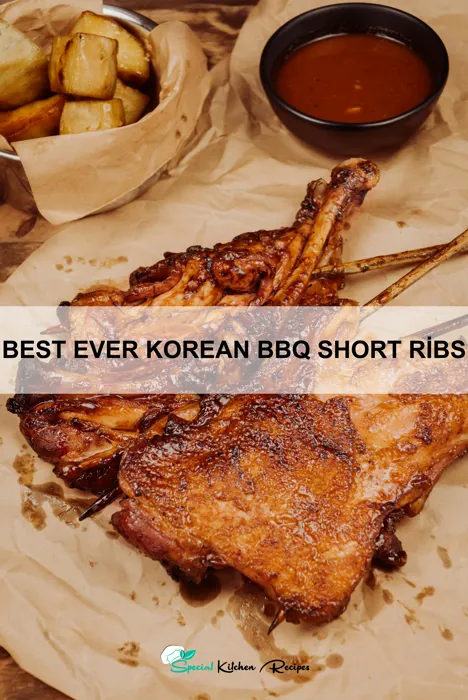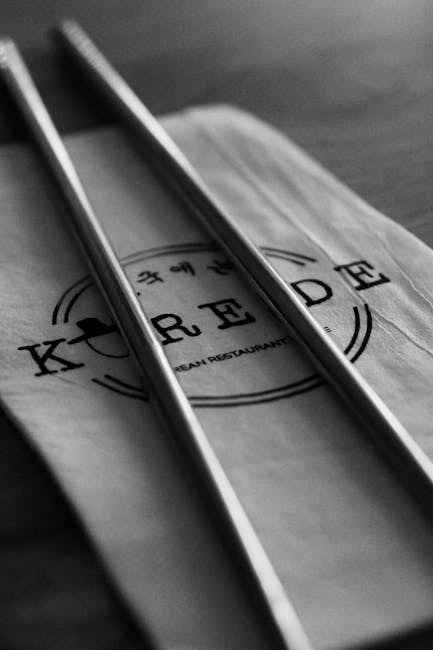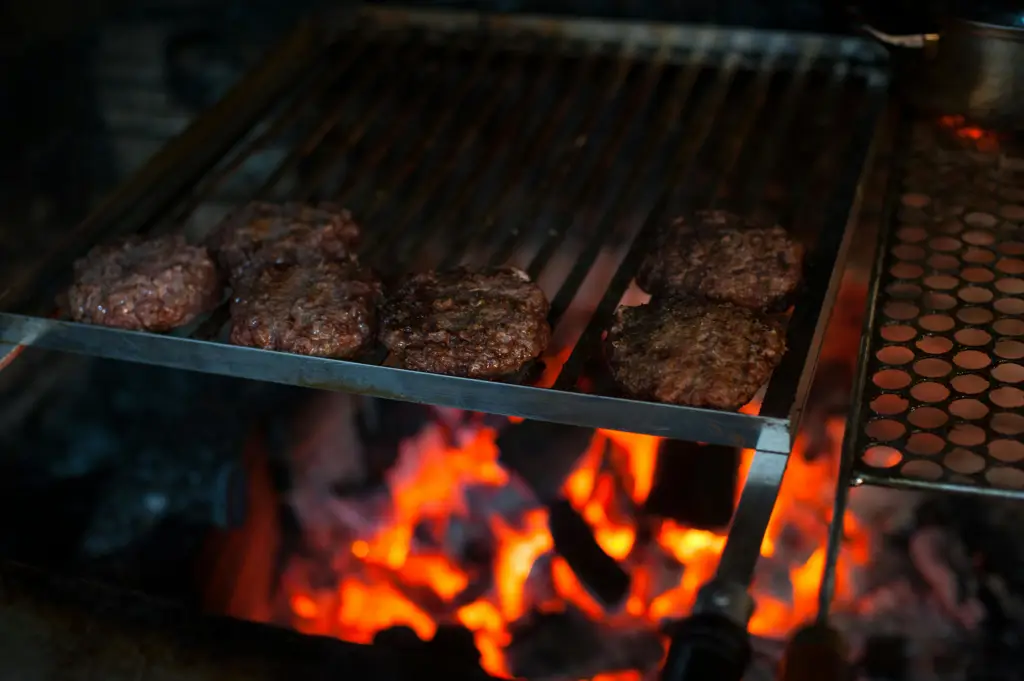Prepare yourself for an unparalleled culinary journey into the heart of Korean cuisine with our recipe for the Best Ever Korean BBQ Short Ribs. These aren’t just short ribs; they’re a testament to a rich culinary heritage. Galbi, the Korean term for grilled short ribs, holds a significant place in Korean culture, often served during celebrations and family gatherings. Its origins trace back centuries, evolving from simple grilling techniques to the complex and flavorful preparations we enjoy today. While precise historical records are scarce, the practice of grilling meat over an open flame has been a staple of Korean cooking for generations, adapting with the availability of different cuts and marinades.
The popularity of Galbi is undeniable. In South Korea alone, the annual consumption of beef, a crucial component of Galbi, exceeds 1 million tons, highlighting the nation’s deep-seated love for this dish. The succulent, fall-off-the-bone texture of perfectly prepared Galbi is a result of both meticulous cuts of meat—typically the flavorful short ribs—and a masterful marinade. This marinade, often a complex blend of soy sauce, garlic, ginger, sesame oil, and a variety of spices, is what distinguishes Galbi from other grilled meats. Each family and restaurant often has its own secret recipe, passed down through generations, leading to a fascinating diversity of flavors. The sweetness, saltiness, and umami notes create a harmonious balance that tantalizes the taste buds.
Beyond its deliciousness, Galbi holds significant cultural weight. It’s frequently featured at celebrations like Chuseok (Korean Thanksgiving) and Seollal (Lunar New Year), symbolizing prosperity and togetherness. The communal aspect of preparing and sharing Galbi at the table further emphasizes its social importance. The act of grilling the meat together, often at a table-top grill, fosters interaction and strengthens bonds, making it more than just a meal; it’s an experience. Understanding the history and cultural significance of Galbi enhances the appreciation of this incredible dish, transforming a simple meal into a journey through Korean culinary traditions. Get ready to experience the magic!
Ingredients and Measurements
This recipe for Best Ever Korean BBQ Short Ribs relies on high-quality ingredients to achieve its exceptional flavor. Precise measurements are crucial for balance, so please use a kitchen scale for the most accurate results, especially for the marinade.
For the Short Ribs (approximately 2 lbs): You’ll need about 2 lbs of beef short ribs, preferably bone-in for richer flavor and better texture. Look for well-marbled short ribs for optimal tenderness and juiciness. Choose a cut specifically labeled for BBQ or grilling, as these are typically more suitable for longer cooking times.
For the Marinade: The marinade is the heart of this dish. The following measurements are crucial to achieving the perfect balance of sweet, savory, and spicy flavors.
- Gochujang (Korean chili paste): 4 tablespoons. This provides the signature fiery kick. Adjust according to your spice preference; start with less and add more gradually.
- Soy Sauce: 1/4 cup (60ml). Use a high-quality soy sauce for the best flavor. Do not substitute with low-sodium soy sauce unless you adjust the salt content of other ingredients accordingly.
- Brown Sugar: 2 tablespoons. Provides sweetness and helps create a beautiful glaze during cooking.
- Korean Pear (or Asian Pear): 1 medium, finely grated. This adds natural sweetness and tenderness to the meat.
- Garlic: 4 large cloves, minced. Essential for a robust savory flavor profile.
- Ginger: 1 tablespoon, minced. Adds warmth and complexity.
- Sesame Oil: 1 tablespoon. Contributes a nutty aroma and richness.
- Rice Wine Vinegar: 1 tablespoon. Provides a gentle acidity that balances the sweetness and spice.
- Black Pepper: 1 teaspoon, freshly ground. Enhances the overall flavor complexity.
- Optional: 1 tablespoon of Gochugaru (Korean chili flakes) for extra heat. Add this gradually to control the spice level.
For Serving (Optional):
- Steamed rice
- Kimchi
- Sesame seeds
- Chopped green onions
Important Note: Marinate the short ribs for at least 4 hours, or preferably overnight in the refrigerator, for the best flavor penetration. Ensure the meat is completely submerged in the marinade.
Equipment List
Preparing and cooking the best ever Korean BBQ short ribs requires the right equipment. This list details the essential tools, offering recommendations for optimal results and highlighting alternatives where applicable. Having the correct tools will not only enhance the cooking process but also contribute significantly to the final flavour and texture of your short ribs.
Meat Preparation: You’ll need a sharp knife, preferably a butcher’s knife with a blade length of at least 8 inches. This will allow for precise cuts and efficient trimming of excess fat. A smaller paring knife is also helpful for detailed work. Consider investing in a good quality honing steel to maintain the sharpness of your knives. A meat mallet, weighing approximately 1-1.5 pounds, is beneficial for tenderizing tougher cuts of short ribs.
Marinade & Mixing: A large mixing bowl (at least 5-quart capacity) is crucial for marinating the short ribs. Ensure it’s a bowl that can comfortably hold the ribs and the marinade without overflowing. Measuring cups and spoons (ranging from 1 teaspoon to 1 cup) are essential for accurate measuring of ingredients. A whisk is ideal for thoroughly combining the marinade components, ensuring even distribution of flavors.
Cooking Equipment: For grilling, a high-quality grill is paramount. A charcoal grill is traditionally preferred for its smoky flavor, but a gas grill with good heat control is a viable alternative. If using a charcoal grill, you will need approximately 5-6 pounds of high-quality charcoal briquettes. A meat thermometer is essential for ensuring the short ribs reach the desired internal temperature (around 190-200°F for optimal tenderness). Tongs, ideally long-handled for safe handling over hot coals or flames, are needed to maneuver the short ribs during grilling. A grill brush is necessary for cleaning the grill grates before and after cooking.
Serving & Optional Equipment: You’ll need serving platters or dishes suitable for presenting the cooked short ribs. Consider using smaller dishes for serving individual portions. A cutting board, preferably one made of wood or bamboo, is ideal for slicing the short ribs after cooking. Optional but advantageous items include a grill cover to protect your grill from the elements and a pair of kitchen shears for trimming any excess fat or cartilage from the short ribs after they’ve been cooked.
Safety First: Always remember to prioritize safety. Wear heat-resistant gloves when handling hot grilling equipment and use caution when working with sharp knives. Ensure proper ventilation when using a charcoal grill.
Marination Process (including time considerations)
The key to incredibly tender and flavorful Korean BBQ short ribs lies in the marination process. We’ll be using a balanced blend of sweet, savory, and umami elements to create a truly unforgettable dish. This recipe calls for a minimum of 4 hours of marinating time, but overnight (8-12 hours) is highly recommended for optimal flavor penetration and tenderness.
For this recipe, you will need the following marinade ingredients:
- 1/2 cup soy sauce (low sodium preferred)
- 1/4 cup mirin (sweet rice wine)
- 1/4 cup brown sugar (packed)
- 2 tablespoons gochujang (Korean chili paste)
- 2 tablespoons minced garlic
- 1 tablespoon minced ginger
- 1 tablespoon sesame oil
- 1 teaspoon black pepper
- 1/2 teaspoon red pepper flakes (optional, for extra heat)
Begin by combining all marinade ingredients in a large bowl or resealable plastic bag. Whisk thoroughly to ensure the sugar is completely dissolved and the ingredients are well combined. Ensure you are using a non-reactive bowl or bag, such as glass or food-grade plastic, to avoid any unwanted chemical reactions.
Add approximately 2 lbs of short ribs (beef short ribs, cut into 2-3 inch pieces) to the marinade. Make sure the meat is evenly coated by gently turning and massaging the ribs within the marinade. If using a bowl, cover it tightly with plastic wrap. If using a bag, seal it tightly, pressing out any excess air.
Refrigerate the marinated short ribs for at least 4 hours, or preferably overnight (8-12 hours). The longer the marinating time, the more flavorful and tender your short ribs will become. However, marinating for more than 24 hours can make the meat overly salty or soft. Therefore, 8-12 hours is the sweet spot.
Before cooking, remove the short ribs from the marinade and let them sit at room temperature for about 15-20 minutes. This allows them to cook more evenly. Do not discard the marinade! You can use a portion of it to baste the short ribs while grilling or broiling for extra flavor and glaze.
Remember to adjust the amount of marinade according to the quantity of short ribs you are using. The key is to ensure all the meat is adequately covered in the marinade for even flavor penetration.
Meat Preparation (Trimming & Cutting)
Preparing your short ribs for Korean BBQ is crucial for achieving optimal tenderness and flavor. This section details the trimming and cutting process, ensuring perfectly cooked, visually appealing results.
Start with approximately 3 lbs of beef short ribs, preferably bone-in, for a generous serving. Look for ribs with good marbling – the intramuscular fat is key to juicy, flavorful short ribs. Choose ribs with a good balance of meat and bone; avoid overly lean or excessively fatty options.
Trimming: Begin by removing any excess silverskin. Silverskin is the tough, white membrane found on the surface of the meat. Using a sharp paring knife, carefully peel it away. Don’t worry about removing every tiny piece, just the larger, noticeable sections. This will improve texture and prevent the meat from becoming chewy.
Cutting (across the bone): This is where the magic happens. For optimal cooking and presentation, we’ll cut the short ribs across the bone into individual portions. Aim for individual pieces approximately 1-1.5 inches thick. This thickness allows for even cooking and prevents overcooking. If your short ribs are particularly thick, you may need to adjust accordingly.
Important Note: Always use a sharp knife to avoid tearing the meat fibers. A dull knife will crush the meat, resulting in a less tender final product. Consider using a meat cleaver for larger bones, ensuring a clean, even cut.
Cutting (with the bone): Alternatively, you can cut the short ribs *with* the bone. This method maintains the integrity of the bone and is visually stunning. However, ensure you cut the meat into relatively thin slabs (about 1 inch thick) to ensure even cooking. This method requires more precise cutting to avoid leaving excessively large pieces.
After cutting: Once you’ve trimmed and cut your short ribs, you can optionally further enhance the marbling by carefully scoring the fat cap in a crosshatch pattern. This helps the fat render more evenly during cooking, adding flavor and juiciness. However, this step is optional and depends on your preference.
Professional Recommendation: For ease of cooking and even browning, consider separating the meat from the bones after cutting, especially if using the across the bone method. This will allow for more efficient heat transfer and prevent uneven cooking.
With your short ribs meticulously trimmed and cut, you’re ready to move on to the next exciting step of marinating and cooking these delicious Korean BBQ short ribs!
Cooking Method: Achieving Perfectly Tender Korean BBQ Short Ribs
For the best results with Korean BBQ short ribs, we recommend a combination of methods: braising followed by grilling or pan-frying. This ensures incredibly tender meat with a beautiful char. The braising process tenderizes the tough connective tissues, while the final grilling or pan-frying adds that irresistible smoky flavor and crispy exterior.
Braising (Step 1): Begin by marinating your 3 lbs of short ribs (about 6-8 ribs) in your favorite Korean BBQ marinade for at least 4 hours, or preferably overnight in the refrigerator. This allows the flavors to deeply penetrate the meat. Then, sear the short ribs in a large Dutch oven or heavy-bottomed pot over medium-high heat until nicely browned on all sides. This step helps develop rich flavor and creates a beautiful crust.
Once seared, add 1 cup of beef broth, ½ cup of soy sauce, 2 tablespoons of brown sugar, 1 tablespoon of minced garlic, and 1 tablespoon of grated ginger to the pot. Bring the mixture to a simmer, then reduce the heat to low, cover, and braise for approximately 2-2.5 hours, or until the meat is incredibly tender and easily pierced with a fork. Check the tenderness periodically; cooking time may vary depending on the thickness of your ribs and your stovetop.
Grilling/Pan-Frying (Step 2): Once the short ribs are braised, remove them from the pot and set aside. Preheat your grill to medium-high heat (approximately 400°F) or heat a large cast-iron skillet over medium-high heat. If using a grill, lightly oil the grates to prevent sticking.
Grilling: Place the short ribs on the preheated grill and cook for 2-3 minutes per side, until beautifully charred and slightly crispy. Avoid overcooking, as this can dry out the meat. Remember that the meat is already cooked through from the braising process; this step is purely for enhancing the flavor and texture.
Pan-Frying: For pan-frying, add a tablespoon of oil to the preheated skillet. Place the short ribs in the skillet and cook for 2-3 minutes per side, until nicely browned and slightly crispy. Adjust the heat as needed to prevent burning.
Resting: Before serving, allow the short ribs to rest for 5-10 minutes. This allows the juices to redistribute, resulting in a more tender and flavorful final product. Slice the short ribs against the grain before serving. Enjoy your perfectly cooked Korean BBQ Short Ribs!
Important Note: Cooking times are approximate. Always use a meat thermometer to ensure the internal temperature reaches a safe 145°F (63°C).
Sauce Preparation (if applicable)
While many enjoy Korean BBQ short ribs simply seasoned with salt and pepper, a flavorful sauce elevates the experience. This recipe provides a delicious and versatile gochujang-based sauce perfect for glazing your short ribs before grilling and serving as a dipping sauce.
Yields: Approximately 1 cupPrep time: 10 minutes
Ingredients:
- 1/4 cup Gochujang (Korean chili paste)
- 2 tablespoons Gochugaru (Korean chili flakes) – adjust to your spice preference. Start with less and add more for extra heat.
- 2 tablespoons Soy sauce (low sodium preferred)
- 2 tablespoons Rice vinegar
- 1 tablespoon Sesame oil
- 1 tablespoon Honey or brown sugar (for sweetness and glaze consistency)
- 1 tablespoon Minced garlic
- 1 teaspoon grated Ginger
- 1/2 teaspoon Black pepper
- Optional: 1 scallion, finely chopped, for garnish and added flavor
Instructions:
In a medium bowl, whisk together the gochujang, gochugaru, soy sauce, rice vinegar, sesame oil, honey (or brown sugar), minced garlic, grated ginger, and black pepper until a smooth paste forms. Ensure there are no lumps of gochujang; a whisk or a fork works best.
Taste and adjust seasoning as needed. You might want to add more honey for sweetness, more gochugaru for heat, or more soy sauce for saltiness. This is your chance to personalize the sauce to your preferences.
For glazing the short ribs: Brush the sauce generously over the short ribs during the last 10-15 minutes of grilling. This will create a beautiful, sticky, and flavorful glaze. Avoid basting too early, as it can burn the sauce before the ribs are cooked through.
For serving as a dipping sauce: Transfer the sauce to a small bowl and serve alongside your grilled short ribs. Garnish with finely chopped scallions for a vibrant pop of color and fresh flavor. The sauce will thicken slightly as it cools.
Storage: Store leftover sauce in an airtight container in the refrigerator for up to a week. The sauce may thicken further upon refrigeration. You can thin it out with a teaspoon of water or rice vinegar if needed before serving.
Professional Recommendation: Using high-quality gochujang significantly impacts the overall flavor of the sauce. Look for a brand with a deep, rich flavor and vibrant color.
Recommendations for Best Ever Korean BBQ Short Ribs
These Best Ever Korean BBQ Short Ribs are best served immediately after cooking for maximum tenderness and flavor. For the most authentic experience, serve them sizzling hot on a grill plate at the table, allowing your guests to enjoy the delicious char and aromas. Alternatively, you can serve them sliced thinly and arranged artfully on a platter. Consider providing small bowls of various accompaniments for dipping and wrapping, such as sesame oil, gochujang (Korean chili paste), and ssamjang (fermented soybean paste).
To complement the rich and savory short ribs, we recommend serving them with a variety of fresh and vibrant side dishes. Consider a refreshing kimchi salad, a colorful assortment of steamed vegetables (such as spinach, bean sprouts, and mushrooms), and some fluffy white rice to soak up the delicious juices. Japchae (glass noodles with vegetables and meat) or a light and crisp cucumber salad would also be excellent choices to balance the richness of the short ribs. Don’t forget to offer some banchan (Korean side dishes) for a complete and authentic Korean BBQ experience.
For optimal storage, allow the short ribs to cool completely before storing them in an airtight container in the refrigerator. They will keep for up to 3 days. You can also freeze the cooked short ribs for up to 3 months. To reheat, gently warm them in a pan or microwave, adding a little water or broth to prevent drying. Avoid overcooking, as this can make them tough.
Approximate Nutritional Information (per serving, based on a 4-serving recipe): Calories: Approximately 600-700 (depending on the cut of meat and cooking method). This is an estimate and can vary significantly. For a more precise calculation, please use a nutrition calculator with the exact ingredients and quantities used in your recipe. The dish is high in protein and fat, and contains varying amounts of carbohydrates depending on the accompanying sides.
Important Note: The calorie and nutritional information provided is an estimate and may vary depending on the specific ingredients used and portion sizes. For accurate nutritional information, we recommend using a nutrition calculator and inputting your specific recipe details.





